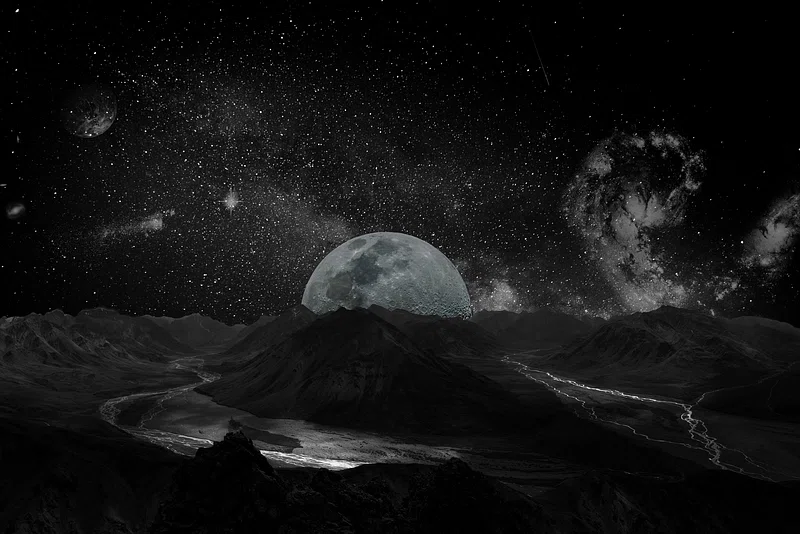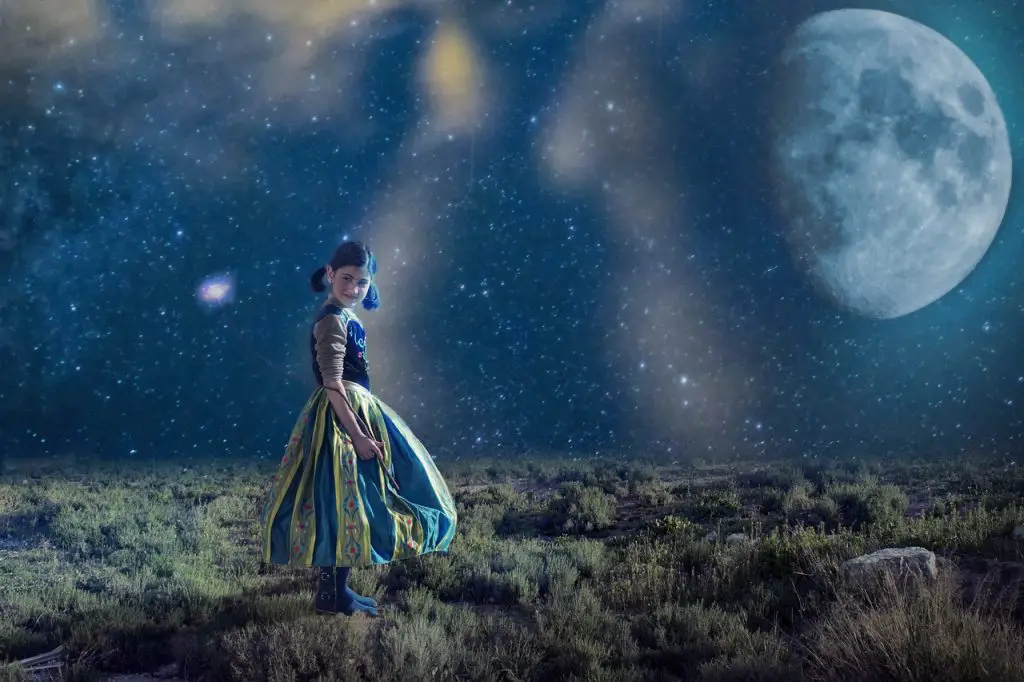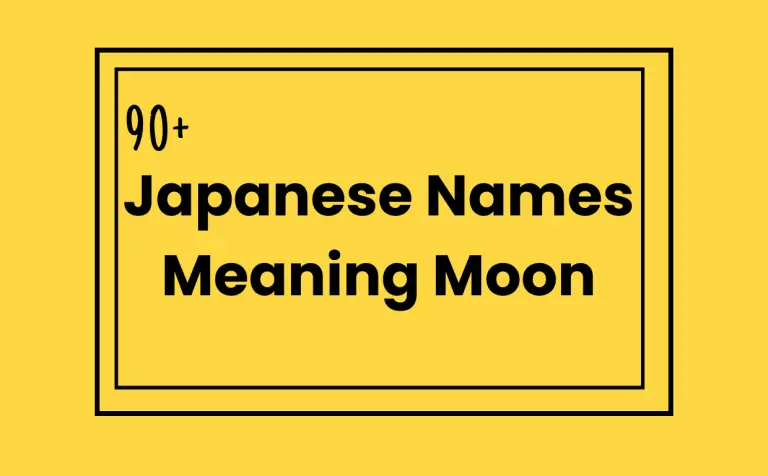Japanese names often have beautiful meanings, and those Japanese names meaning moon are exceptional. The moon has always been important in Japanese culture, appearing in many stories and poems. These moon-related names are not just pretty words; they show how much nature, especially the moon, is loved and respected in Japan.
Exploring Japanese names with the meaning “moon” is like walking in a moonlit garden, discovering the beauty of Japan’s traditions. Each name tells a story connected to old tales and the natural world. This journey teaches us about Japanese culture, showing us how names are more than just what people are called; they carry deep meanings and history.
30+ Famous Japanese Names Meaning Moon
Each of these names reflects the deep cultural significance and poetic beauty associated with the moon in Japanese culture.
Akari (明り) – Meaning “light” or “moonlight,” derived from “Aka” (light) and “Ri” (village).
Tsukiko (月子) – Literally means “moon child”, from “Tsuki” (moon) and “Ko” (child).
Mitsuki (光月) – Combining “Mitsu” (light) and “Ki” (moon), it means “beautiful moon.”
Hikari (光) – Meaning “light,” often associated with the moon’s brightness.
Yuzuki (優月) – This name combines “Yu” (gentle) and “Zuki” (moon), suggesting a soft moon.
Kaguya (かぐや) – Inspired by the moon princess in folklore, it symbolizes the mystery and beauty of the moon.
Sora (宇宙) – While it means “sky,” it is often associated with the vastness of the night sky and the moon.
Rin (凛) – Signifying “dignified” or “cold,” it can be associated with the serene cold light of the moon.
Aiko (愛光) – Combining “Ai” (love) and “Ko” (light), it can be interpreted as the loving light of the moon.
Mangetsu (満月) – Directly translates to “full moon.”
Shizuki (静月) – From “Shizu” (quiet) and “Ki” (moon), meaning “quiet moon.”
Kiyoshi (清) – Meaning “purity,” often linked to the moon’s pure light.
Tsukasa (司) – While it means “director,” it’s also a popular name due to its moon-like sound.
Mayar (真夜中) – Signifying “midnight,” closely related to the moon.
Luna (ルナ) – Borrowed from Latin, meaning “moon”.
Suzume (雀) – Meaning “sparrow,” but often associated with moonlit nights in poetry.
Tsukihiko (月彦) – “Tsuki” (moon) and “Hiko” (boy), meaning “moon boy”.
Yonaga (夜長) – Means “long night,” evoking images of the moon.
Mizuki (美月) – Combining “Mi” (beautiful) and “Zuki” (moon), meaning “beautiful moon.”
Natsuki (夏希) – While “Natsu” means summer, “Ki” can also mean “moon,” giving it a dual meaning.

Yoru (夜) means “night,” often associated with the moon.
Hoshi (星) – Meaning “star,” but often used in the context of the night sky with the moon.
Minako (美奈子) – “Mina” (beautiful) and “Ko” (child) can be associated with the beauty of the moon.
Satsuki (皐月) – The traditional name for the fifth month of the lunar calendar, often linked with the moon.
Tsukino (月野) – “Tsuki” (moon) and “No” (field), suggesting a field under the moonlight.
Komorebi (木漏れ日) – While it means “sunlight streaming through trees,” it’s often associated with the interplay of light and nature, similar to moonlight.
Sayuri (小百合) – This Means “small lily,” but its gentle nature is often likened to the moon.
Tsukimi (月見) – Literally “moon viewing,” a name inspired by the traditional moon viewing festivities.
Haruki (春樹) – “Haru” (spring) and “Ki” (tree), but also associated with the rebirth represented by the moon.
Ayaka (綾香) – “Aya” (color) and “Ka” (fragrance), suggesting the colorful and enchanting nature of the moon.
Chisato (千里) – Meaning “a thousand miles,” evoking the vast distance to the moon.
30+ Japanese Girl Names Meaning Moon
The female Japanese names meaning moon reflect various aspects of the moon’s beauty, mystery, and significance in Japanese culture, offering a wide range of choices for naming a girl.
Amaterasu (天照) – Named after the Shinto sun goddess, often associated with heavenly bodies including the moon.
Chikako (千佳子) – “Chi” (thousand), “Ka” (good), and “Ko” (child), suggesting the beauty of a moonlit night.
Emiko (恵美子) – “Emi” (blessed, beautiful) and “Ko” (child), a name that can evoke the grace of moonlight.
Fumiko (文子) – “Fumi” (scholarly, literary) and “Ko” (child), hinting at the poetic nature of the moon.
Haruka (遥) – Meaning “distant,” symbolizing the far-reaching glow of the moon.
Itsuki (樹) – While it means “tree,” it’s often chosen for its soft sound, reminiscent of the gentle moon.
Junko (純子) – “Jun” (pure) and “Ko” (child), suggesting the purity of moonlight.
Kanako (佳奈子) – “Kana” (beautiful) and “Ko” (child), a name reflecting the beauty of the moon.
Kimiko (君子) – “Kimi” (noble) and “Ko” (child), evoking the nobility associated with the moon.
Maiko (舞子) – “Mai” (dance) and “Ko” (child), like the dance of moonlight on water.
Naoko (尚子) – “Nao” (esteemed) and “Ko” (child), a name of respect like the adoration of the moon.
Noriko (典子) – “Nori” (law, rule) and “Ko” (child), signifying the regular phases of the moon.
Otoha (乙羽) – A unique name that evokes the image of a feather under the moonlight.
Riko (理子) – “Ri” (logic, reason) and “Ko” (child), a name suggesting the wisdom of the moon.
Sakiko (咲子) – “Saki” (blossom) and “Ko” (child), like flowers blooming under the moonlight.

Tamiko (民子) – “Tami” (people) and “Ko” (child), a familiar name with a gentle, moon-like quality.
Umeko (梅子) – “Ume” (plum) and “Ko” (child), reminiscent of plum blossoms in the moonlight.
Wakana (若菜) – “Waka” (young) and “Na” (greens), a fresh and youthful name like the new moon.
Yasuko (康子) – “Yasu” (peace) and “Ko” (child), symbolizing the peacefulness of a moonlit night.
Yukiko (雪子) – “Yuki” (snow) and “Ko” (child), like the serene beauty of snow under the moon.
Akiko (秋子) – “Aki” (autumn) and “Ko” (child), a name that evokes the autumn moon.
Hinako (陽菜子) – “Hina” (sunlight) and “Ko” (child), a bright and warm name like moonlight.
Izumi (泉) – Meaning “spring” (as in water), often associated with the reflective quality of the moon on water.
Kaede (楓) – “Maple,” a name that can evoke the image of maple leaves under the moonlight.
Mai (舞) – Meaning “dance,” suggestive of the elegance of the moon’s movement across the sky.
Nanami (七海) – “Nana” (seven) and “Mi” (sea), like the moon reflecting over seven seas.
Reika (麗華) – “Rei” (lovely) and “Ka” (flower), a name as lovely as the moonlit night.
Sayaka (紗也加) – “Saya” (swift) and “Ka” (increase), a name with the lightness and beauty of the moon.
Tomoko (知子) – “Tomo” (knowledge) and “Ko” (child), a name suggesting the wisdom of the moon.
Yumi (弓) – Meaning “bow,” it can evoke the shape of a crescent moon.
Check Also: Japnese Names that Mean Star
30+ Boys Japanese Names Meaning Moon
The following Japanese male names meaning moon reflect various aspects of the moon, such as its brightness, mystery, and poetic symbolism in Japanese culture. Each name offers a unique take on the moon’s influence and beauty.
Akio (昭夫) – “Aki” (bright) and “O” (man), a name that can be associated with the bright moon.
Daiki (大輝) – “Dai” (large, excellent) and “Ki” (brightness), suggesting the incredible brightness of the moon.
Eiji (英二) – “Ei” (excellent) and “Ji” (two), a name that can symbolize the dual nature of the moon.
Fumio (文雄) – “Fumi” (scholarly, literary) and “O” (male), hinting at the poetic nature of the moon.
Haruto (陽斗) – “Haru” (sun) and “To” (person), often chosen for its sunny disposition, similar to the gentle moon.
Isamu (勇) – Meaning “courage,” symbolizing the boldness of the moon in the night sky.
Junichi (純一) – “Jun” (pure) and “Ichi” (one), suggesting the purity and singularity of the moon.
Kaito (海斗) – “Kai” (sea) and “To” (person), like the moon that controls the tides.
Kenji (健二) – “Ken” (healthy, firm) and “Ji” (two), a name with a robust and moon-like presence.
Masato (正人) – “Masa” (correct) and “To” (person), a name that can evoke the steadiness of the moon’s cycle.
Naoki (直樹) – “Nao” (straight) and “Ki” (tree), like the moon’s straight path across the sky.
Osamu (修) – Meaning “discipline,” symbolizing the disciplined cycle of the moon.
Ryoichi (良一) – “Ryo” (good) and “Ichi” (one), a name reflecting the goodness of the moon.
Shinji (信二) – “Shin” (trust) and “Ji” (two), suggesting the trustworthiness of the moon.
Takumi (匠) – Meaning “artisan,” symbolizing the meticulous craft of the moon’s phases.
Yasuhiro (康弘) – “Yasu” (peace) and “Hiro” (broad, comprehensive), a name symbolizing the peaceful expanse of the moonlit sky.
Yoshiro (吉郎) – “Yoshi” (good luck) and “Ro” (son), a name as auspicious as the moon.

Zen (善) – Meaning “good,” often associated with the good omen of a clear moonlit night.
Hiroto (大翔) – “Hiro” (large, command) and “To” (fly), suggesting the grandeur of the moon’s journey across the sky.
Kyo (京) – While it means “capital,” it has a poetic sound that can be associated with the moon.
Manabu (学) – Meaning “to learn,” like learning from the moon’s phases.
Noboru (昇) – Meaning “ascend,” like the moon rising in the sky.
Riku (陸) – While it means “land,” it can also evoke the image of the moon over the land.
Satoru (悟) – Meaning “enlightenment,” similar to the enlightening presence of the moon.
Toshiro (俊郎) – “Toshi” (talented) and “Ro” (son), a name as impressive as the moon.
Yuji (勇二) – “Yu” (brave) and “Ji” (two), a name symbolizing the bravery of the moon in the night sky.
Asahi (朝日) – “Morning sun,” often chosen for its bright, moon-like quality.
Ryota (亮太) – “Ryo” (brightness) and “Ta” (thick, significant), suggesting the bright presence of the moon.
Taiga (大河) – “Tai” (significant) and “Ga” (river), like the moon’s reflection on a large river.
Yuto (勇人) – “Yu” (brave) and “To” (person), a name that can evoke the boldness and beauty of the moon.
Frequently Asked Questions About Japanese Names that Mean Moon
What is the significance of moon-themed names in Japanese culture?
Moon-themed names in Japanese culture are highly significant due to the moon’s prominent role in customs and poetry and as a symbol of beauty, mystery, and emotional depth. These names are often chosen to convey a sense of elegance, peace, and the natural cycles of life.
Can these names be used for both boys and girls?
Yes, many Japanese names are unisex and can be used for both boys and girls. However, some names may have a more traditionally masculine or feminine connotation based on their meaning or historical usage.
How are these names chosen for a child?
Names meaning moon are often chosen for their lyrical sound, cultural significance, or the personal preference of the parents. Sometimes, they are selected based on the birth time or season, associating the child with the moon’s qualities during that period.
Do these names have any specific connotations or associations?
Yes, names associated with the moon often carry connotations of beauty, artistic sensibility, a calm or peaceful nature, and a connection with the natural world. They may also evoke imagery of nighttime, peace, and a sense of the mystical or romantic.
Conclusion
Japanese names meaning moon are more than just labels; they are a poetic expression of cultural values and aesthetics. They encapsulate the beauty, mystery, and profound connection to the natural world central to Japanese culture.
